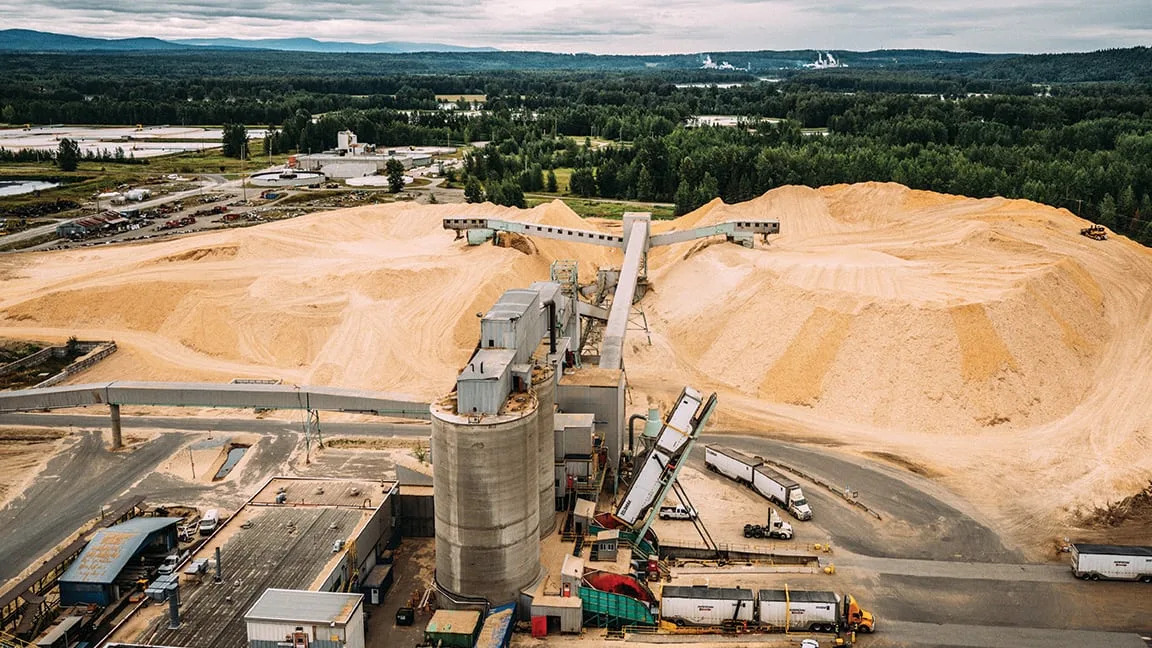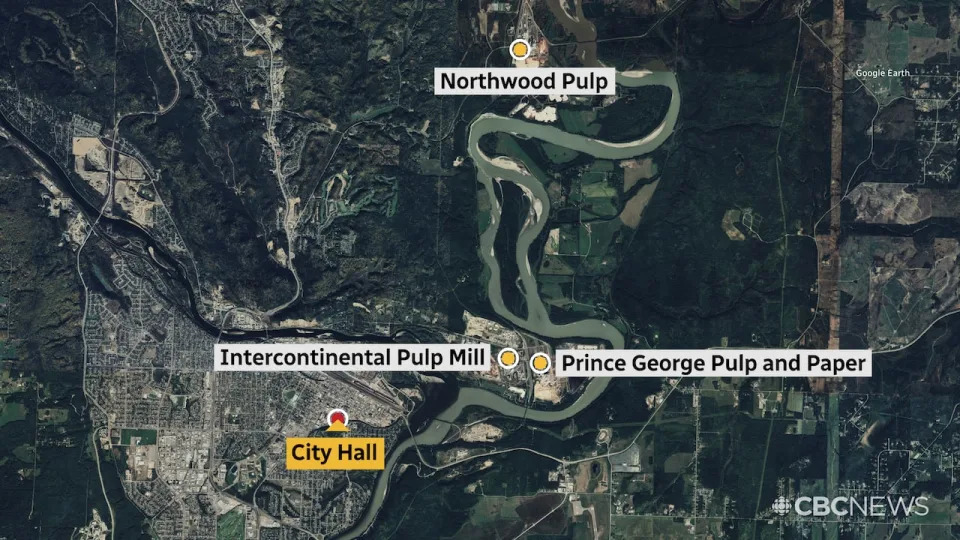Canfor to close sawmill, curtail pulp production citing B.C. policy changes
The Canadian Press
Canfor has announced it is permanently closing its Polar sawmill in Bear Lake, B.C., shutting a production line at its Northwood Pulp Mill in Prince George, and suspending its "planned reinvestment" in Houston, B.C.
The company says in separate news releases that the closures will impact 400 jobs, 180 at its Polar mill and 220 at the Northwood facility.
The company says a shortage of fibre is the reason behind the indefinite curtailment of one production line at the Northwood pulp mill, while Canfor president Don Kayne says timber is critical for its sawmill, but the harvest level has "declined dramatically."
He says the decline is partly due to natural disturbances, like beetle infestations and wildfires, but also to policy and regulation changes that have "hampered" Canfor's ability to access enough fibre to support its facilities, forcing the closures.
Canfor announced last September that it was planning to spend $200 million on a state-of-the-art mill in Houston, west of Prince George, shortly after it had announced the closure of its sawmills in Houston and Chetwynd.
The Polar sawmill, about 70 kilometres north of Prince George, had an annual production capacity of about 300 million board feet, but has been shut since January.
Kayne says in a news release that the company's ability to reliably access enough timber to run the facilities is critical for the business.
"Unfortunately, while our province has a sufficient supply of timber available for harvest as confirmed by the allowable annual cut set by B.C.’s chief forester, the actual harvest level has declined dramatically in recent years.
"In 2023 the actual harvest was 42 per cent lower than the allowable cut, a level not seen since the 1960s," Kayne says.
Canfor Pulp, a subsidiary company, says it currently operates two pulp production lines out of its Northwood facility, which will continue to operate for the next few weeks, followed by an "orderly wind-down process" of one line.
This report by The Canadian Press was first published May 9, 2024.
Hundreds of jobs affected as Canfor makes
cuts in northern B.C.
CBC
Thu, May 9, 2024

The Northwood Pulp Mill in Prince George produces bleached softwood kraft pulp. (Canfor - image credit)
B.C. forestry giant Canfor has dealt a major blow to communities in northern B.C. with announcements affecting hundreds of jobs.
In a series of releases issued Thursday, the company said it is curtailing a production line at its Northwood pulp mill facility in Prince George, permanently closing its Polar sawmill in Bear Lake and suspending plans to reinvest in its facility in Houston, B.C.
Four-hundred existing and 200 anticipated replacement jobs are impacted by the decision.
One-hundred-eighty employees will lose their positions at the Polar sawmill in Bear Lake, an unincorporated community of roughly 150 people located 75 kilometres north of Prince George. Operations at the mill had been curtailed since January.

CANFOR office is pictured in Vancouver, British Columbia on Tuesday, September 20, 2022.
Canfor's head office is pictured in Vancouver in 2022. (Ben Nelms/CBC)
A further 220 jobs will be impacted by the indefinite curtailment of a single production line at the Northwood pulp mill in Prince George, a processing plant that converts wood chips to pulp and paper products.
Approximately 450 people work at that facility.
And in Houston, about 300 kilometres west of Prince George, an anticipated 200 new jobs are now on hold as Canfor suspends its promise to build a new $200-million manufacturing facility after eliminating 300 jobs with the closure of the community's sawmill last year.
Canfor will continue to operate Northwood at a reduced capacity, as well as Intercontinental and Pulp and Paper, also in Prince George.
Jonathan Blacker, who works at Northwood and is president of Unifor Local 603 in Prince George, said the news was a blow to workers.
"They're pretty depressed right now, angry, shaken up, not knowing what the future holds because there's no clarity … It's so fresh that nobody knows what's going on," Blacker said.

Two of Canfor's pulp mills are located in the river valley of Prince George.
Two of Canfor's pulp mills are located in the river valley of Prince George. (CBC News)
Series of reductions
In its announcements, posted online, the company blames a decline in the amount of available fibre in the region, as well as "policy changes and increased regulatory complexity" for the decisions.
In one of the written statements, Canfor Pulp CEO Kevin Edgson said the decision to cut back production is a direct result of reductions and closures of sawmills in the region.
With less wood waste being produced, he said, there is less material available for the pulp mill to convert.
"Despite exhaustive efforts, including expanding well beyond our traditional operating region, there is simply not enough residual fibre to supply the current production capacity of all our operations."
Those closures include Canfor-run sawmills in Chetwynd, about 300 kilometres north of Prince George, and Houston, one year ago, which resulted in more than 490 jobs being lost as part of a series of curtailments and closures across the industry.
Houston was supposed to recover some of those jobs with a new manufacturing facility being built over the next three years, but now Canfor is suspending that decision, citing an uncertain economic future.
It did not say if any form of operations will resume at the site, or if it will simply remain closed.
Stephen Mackie, executive vice-president of North American operations at Canfor, says the cuts are a result of a drop in harvest levels related to natural disturbances such as beetle infestations and wildfires.
He also said policies such as old-growth deferrals at the provincial and district levels have constrained supply. Policies like the Tripartite Framework Agreement on Nature Conservation — an agreement between Ottawa, the province and First Nations to mutually support protecting 30 per cent of lands and waters by 2030 — have the potential to create uncertainty, he says.
"The pace and scale of those policy choices and changes and the increased regulatory complexity that has been introduced over the last several years, all of those things are serving to constrain the fibre supply and add cost to British Columbia," Mackie said.
Blacker says the industry is in "dire straits" due to corporate and government mismanagement.
Trees have been replanted, he says, but have been harvested too quickly.
"They were greedy," he said of the industry. "You don't let a kid into a candy shop and say, 'Have at it, manage it,' which the government allowed ... So they cut and they cut and they cut."
Cutting too quickly forced workers to go farther into the forest to get fibre, he said, which became less economical.
"It's been mismanaged and now we're losing jobs because of it," he said.
In a statement, B.C. Minister of Forests Bruce Ralston said he was disappointed by Canfor's decision, saying the province will be there to support affected workers and communities.
"Workers shouldn't bear the brunt of commodity cycles as they have been forced to for years," he said, adding that the province has been working to stabilize the sector.
No comments:
Post a Comment